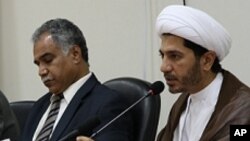A Bahraini court sentenced the country's leading Shi'ite opposition figure to four years in prison on Tuesday amid an ongoing crackdown on dissent in the tiny island kingdom.
Sheikh Ali Salman, a key figure in the 2011 uprising against the Sunni monarchy, was convicted of insulting the Interior Ministry, which oversees police, inciting others to break the law and inciting hatred against naturalized Sunni citizens, many of whom are of South Asian descent and serve in the country's security forces.
However, the court found Salman not guilty of the most serious charge he faced, which was inciting violence and calling for the overthrow of the monarchy, which carried a potential life sentence. His defense lawyer, Abdullah al-Shamlawi, said Salman can appeal.
Salman, 49, is the secretary-general of the al-Wefaq political opposition group and was arrested in late December. The charges against him stem from speeches he made between 2012 and 2014.
Al-Wefaq says his words were taken out of context. After the verdict, al-Wefaq member Khalil Marzooq said that Salman's imprisonment is an impediment to any hopes of reform or dialogue.
"Keeping Ali Salman in jail means delaying any political solution to come and reflects the government's rejection to a political solution," he said.
Bahrain, which hosts the U.S. Navy's 5th Fleet, sees near-daily protests backed by the country's Shiite majority, who demand greater say in the government.
Al-Wefaq is among Bahrain's most vocal and organized opposition groups. The group, which boycotted last year's parliamentary elections, is demanding greater power-sharing between elected lawmakers and the monarchy, the release of political prisoners and a prime minister chosen by elected officials.
Salman's case has attracted international attention, including criticism from Shiite powerhouse Iran. The European Union warned his arrest could jeopardize the already-difficult security situation in Bahrain. The U.S. has urged that he be tried in a just and transparent way.
The government accuses the opposition of repeatedly rejecting offers to hold a national dialogue.




